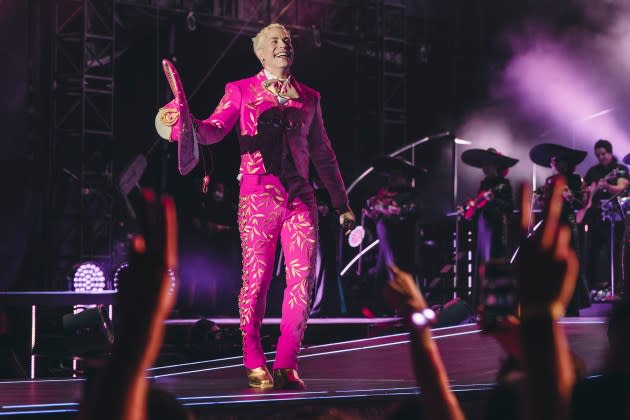RBD’s Christian Chavez Wants His LGBTQ Fans to Feel Seen — And He’s Not Letting Homophobia Stop Him
- Oops!Something went wrong.Please try again later.

The rainbow colors of the LGBTQ pride flag have flooded the stage every night during RBD’s Soy Rebelde Tour, which kicked off on Aug. 25. Christian Chávez, a charismatic member of the 5-person band, uses this moment to launch into a special solo performance of RBD songs.
He often wears sparkly makeup, corsets, and bright colors, embracing his queerness by pushing gender norms on stage. It’s here that he often shares a speech about acceptance and inclusion in the community.
“It’s the best thing that could’ve happened. It’s infinite happiness,” he tells Rolling Stone about reuniting with his RBD bandmates and embracing his queerness on the road. “It’s like finally opening the door to that little Christian in me and saying, ‘I love you. Enjoy this. This is you. I’m proud of you.’ For me, in the psychological sense, it has been liberating.”
More from Rolling Stone
It’s near-daily healing for the pop star who was outed by a Mexican tabloid years ago. But despite fans embracing Chavez’s words of wisdom and onstage lewks with applause and cheers, he’s also faced intense scrutiny for some of his choices in attire and props onstage.
Earlier this month, several Latino news outlets criticized the singer for holding up a Mexican flag that featured the Pride rainbow. And, after a show at Madison Square Garden the week prior, the singer was called out for sporting a pink Charro-inspired outfit with tennis shoes instead of cowboy boots. The charro debacle culminated with Chavez issuing an apology after the leader of the Mexican Federation of Charrería, posted a lengthy statement disapproving of Chavez’s outfit, calling for him to “conform to our canons.”
Chavez has since sat back and looked at the criticism with a new perspective. “My human reaction when I was getting attacked was to apologize. It’s something that, as a gay person who once wanted everyone to love me and not reject me, I felt the need to do,” he says. “But after thinking about it, I thought ‘This is not what I’m fighting for.’ I honestly did nothing wrong. I didn’t disrespect anyone… I’m tired of apologizing.”
The charro con tenis incident? The boots simply hadn’t arrived on time. “I wasn’t at an equestrian event, nor was I doing charrería,” he says. “I was just taking something as Mexican as a mariachi outfit and Mexican pink and placed them on a pop stage. That’s my art.” (Mariachi artists like Vicente Fernandez and his son Alejandro often donned colorful charro outfits on stage to little to no criticism.)
The pride Mexican flag moment? A fan threw it to him onstage. “Some media said I altered the flag and was disrespecting it. It was just a moment that happened after a Mexican, gay fan gave that flag to me,” he says. “I felt that pride [to be Mexican and queer] too and I wanted to share that with her.”
For Chavez, and for many of the LGBTQ fans who’ve come to his defense online, the criticism they’ve seen is really born really from an intense, internalized homophobia that exists in much of the Mexican community — along with a touch of both machismo and malinchismo, a term that describes Mexican self-hatred.
“Mexicans are harsh against other Mexicans. It’s internalized homophobia and it’s a way of putting your ideology out there without feeling like you’re talking about sexuality directly,” Chavez says. “Most of the negative messages were talking more about my sexuality, not about the charro suit itself. That’s why I think it’s sad and worrisome that this is still happening.”
“I think so many people in the LGBTQ community are tired of apologizing and seeking validation. ‘You can do that but in private. You can be gay but don’t dress like that,’” he adds. “Ya basta.”
Chavez had considered staying silent, to just let the controversy pass by, but he realized: “We have to talk about this. Regardless of how I might feel, talking about these subjects is so important.”
Chavez isn’t going to let the hate comments get to him as the Soy Rebelde continues its course across the U.S., and later, in Latin America. “De todos modos, ya estoy curtido,” he says. “I’m used to it anyway.” Instead, he says he’ll take these as learning moments for himself and for the community at large.
“I’m not going to stay quiet. I’m not going to change who I am. The old Christian is gone and he won’t come back. Some might think it’s disrespecting others, but it’s simply living our lives and being ourselves,” he says. “When you start being yourself, there will always be people who’ll try to take your shine. Don’t allow that. Love yourself, respect yourself, enjoy yourself, and say what you feel. Life goes by too quickly.”
Hours after facing criticism for the charro outfit incident, Chavez decided to make an Instagram post with pictures of the outfit anyway. In the background, the ranchera song “No Soy Monedita de Oro” by Cuco Sánchez played. “I’m not a gold coin to make everyone like me/This is how I was born, this is how I am,” the song goes. “If they don’t love me… oh well.”
Best of Rolling Stone
